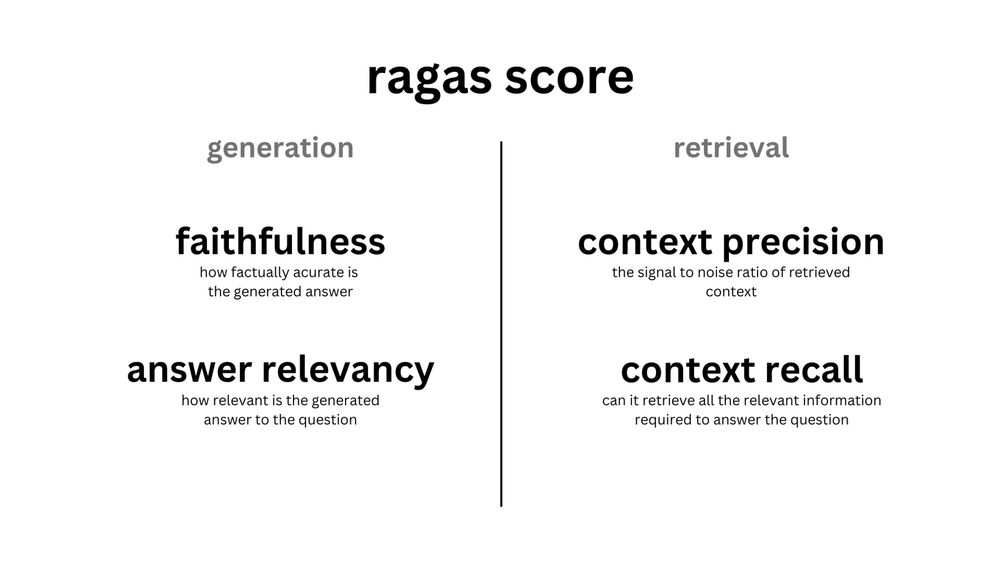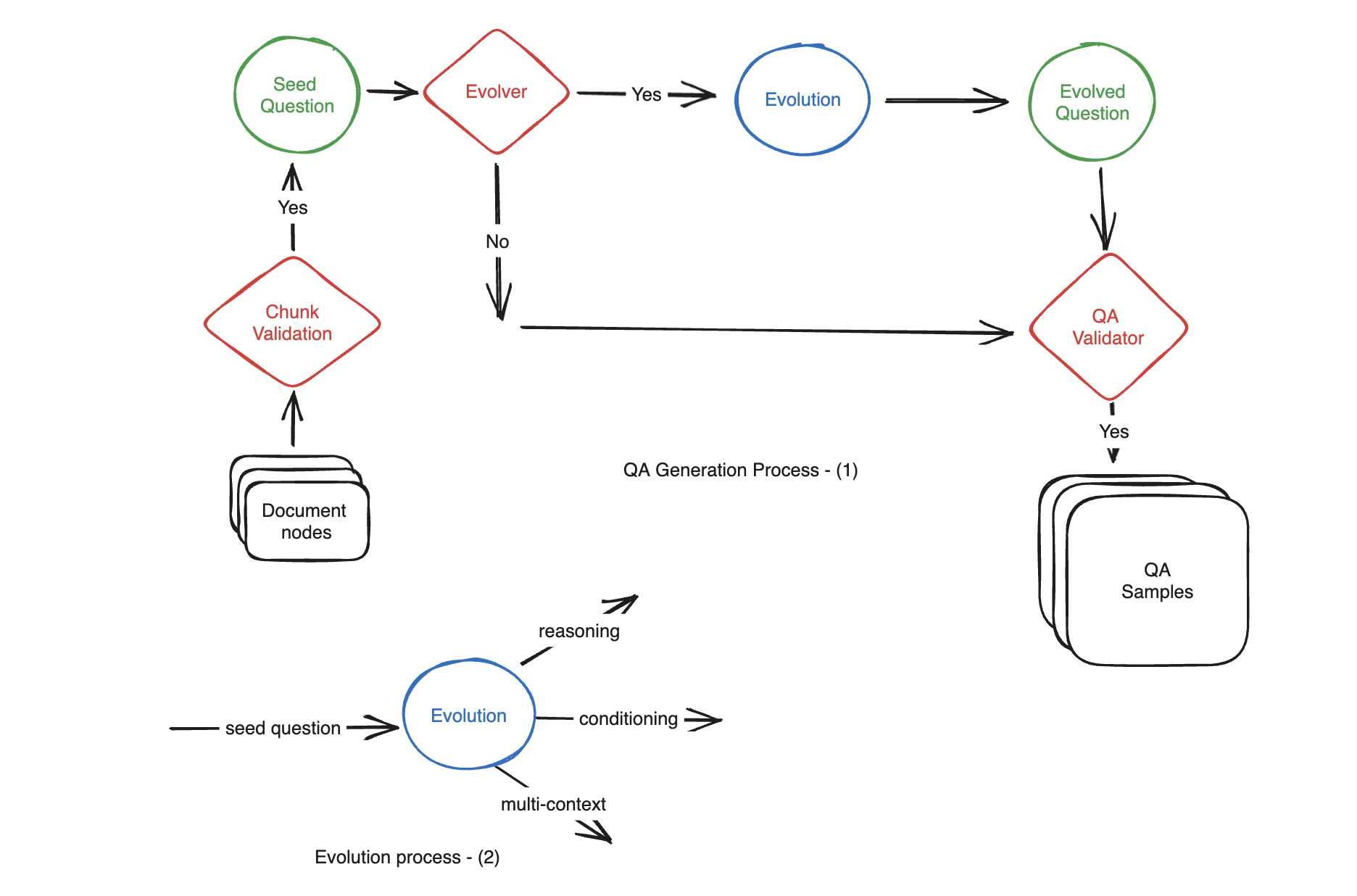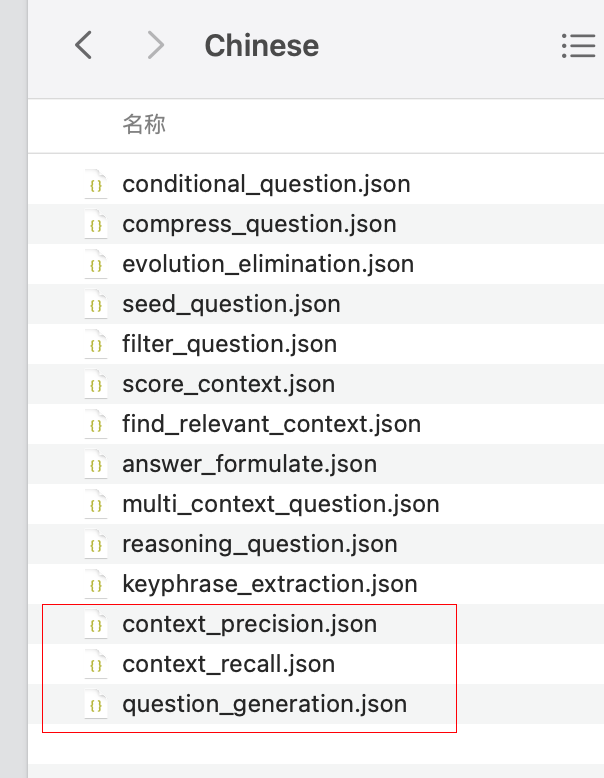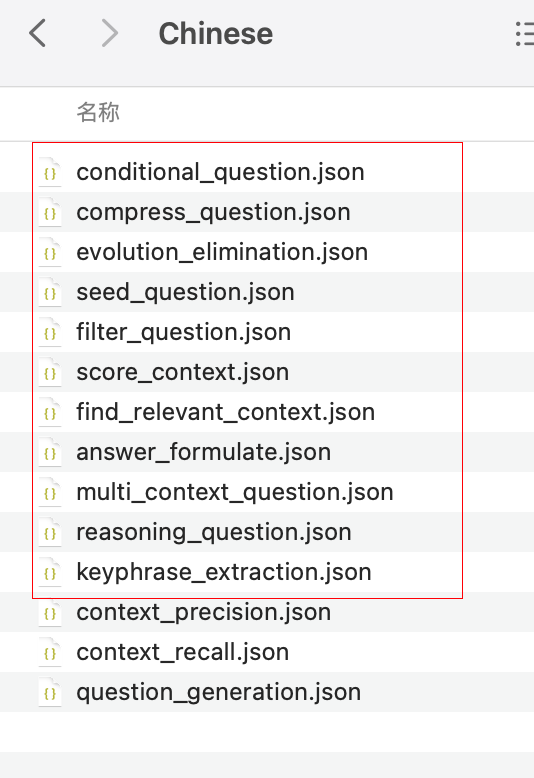Ragas
Schnellstart
Konzept
| 概念 | 含义 |
|---|---|
| Question | |
| Contexts | Retrieved contexts:实际找到的Context |
| Answer | 最终生成的答案 |
| Ground truths | 参考答案 |
Datensatz
from datasets import Dataset
data_samples = {
'question': ['When was the first super bowl?', 'Who won the most super bowls?'],
'answer': ['The first superbowl was held on January 15, 1967', 'The most super bowls have been won by The New England Patriots'],
'contexts' : [['The Super Bowl....season since 1966,','replacing the NFL...in February.'],
['The Green Bay Packers...Green Bay, Wisconsin.','The Packers compete...Football Conference']],
'ground_truth': ['The first superbowl was held on January 15, 1967', 'The New England Patriots have won the Super Bowl a record six times']
}
dataset = Dataset.from_dict(data_samples)
Metrisch

| Metric | |||
|---|---|---|---|
| Context Precision | Retrieval | Question | 是否跑题:检索结果 与 Quesion 是否相关 |
| Answer Relevance | Anwser | Question | 是否跑题:生成的答案 是否与 Question 相关 |
| Faithfulness | Anwser | Retrieval | 是否参考引用:生成的答案 是否忠诚于 检索结果 |
| Context Recall | Retrieval | 参考答案 Ground Truth | 检索的准确性: 检索结果 与 参考答案 是否相关 |
Prompt
Kontext Präzision
Given question, answer and context verify if the context was useful in arriving at the given answer. Give verdict as "1" if useful and "0" if not with json output.
The output should be a well-formatted JSON instance that conforms to the JSON schema below.
……
Your actual task:
question: 法国的首都是什么?
context: 巴黎是法国的首都。
answer: 巴黎
verification:
Antwort Relevanz
Die Prompt versteht sich nicht.
Generate a question for the given answer and Identify if answer is noncommittal. Give noncommittal as 1 if the answer is noncommittal and 0 if the answer is committal. A noncommittal answer is one that is evasive, vague, or ambiguous. For example, "I don't know" or "I'm not sure" are noncommittal answers
……
Your actual task:
answer: 巴黎
context: 巴黎是法国的首都。
output:
Treue
Create one or more statements from each sentence in the given answer.
……
Your actual task:
question: 法国的首都是什么?
answer: 巴黎
statements:
Your task is to judge the faithfulness of a series of statements based on a given context. For each statement you must return verdict as 1 if the statement can be verified based on the context or 0 if the statement can not be verified based on the context.
……
Your actual task:
context: 巴黎是法国的首都。
statements: ["\u6cd5\u56fd\u7684\u9996\u90fd\u662f\u5df4\u9ece\u3002"]
answer:
Kontext Recall
Given a context, and an answer, analyze each sentence in the answer and classify if the sentence can be attributed to the given context or not. Use only "Yes" (1) or "No" (0) as a binary classification. Output json with reason.
……
Your actual task:
question: 法国的首都是什么?
context: 巴黎是法国的首都。
answer: 巴黎
classification:
Synthetische Daten erstellen
Motivation: Das manuelle Erstellen von Hunderten von QA (Frage-Kontext - Antwort) - Beispielen aus einem Dokument kann zeitaufwändig und anstrengend sein. Verwenden Sie LLM, um automatisch zu generieren
Einfache, * * Reasoning, Conditioning, Multi-Context * *
Diese Kategorie heißt: * * evolution * *

Bei der Erstellung werden die Anteile dieser drei Kategorien angeben.
from ragas.testset.generator import TestsetGenerator
from ragas.testset.evolutions import simple, reasoning, multi_context
from langchain_openai import ChatOpenAI, OpenAIEmbeddings
# documents = load your documents
# generator with openai models
generator_llm = ChatOpenAI(model="gpt-3.5-turbo-16k")
critic_llm = ChatOpenAI(model="gpt-4")
embeddings = OpenAIEmbeddings()
generator = TestsetGenerator.from_langchain(
generator_llm,
critic_llm,
embeddings
)
# Change resulting question type distribution
distributions = {
simple: 0.5,
multi_context: 0.4,
reasoning: 0.1
}
# use generator.generate_with_llamaindex_docs if you use llama-index as document loader
testset = generator.generate_with_langchain_docs(documents, 10, distributions)
testset.to_pandas()
Daten lesen.
LangChain offiziell verwendet, LangChain weiterhin verwenden, nicht leicht Probleme zu haben.
Automatische Sprachanpassung
Bewertungen
Übersetzen Sie die in der Auswertung verwendeten Aufforderung auf Chinesisch, verwenden Sie das gpt - 4 - turbo-preview - Modell; lokal zwischengespeichert.
Die Eingabeaufforderungen zu den jeweiligen Metriken werden automatisch an die Zielsprache angepasst.
Der Speicher-Schritt speichert es standardmäßig in
. cacha / ragasfür die spätere Wiederverwendung.
# 将Metric中的Prompt翻译成中文
from datasets import Dataset
# from langchain.chat_models import ChatOpenAI
from langchain_openai import ChatOpenAI, OpenAI
from ragas.metrics import (
answer_relevancy,
faithfulness,
context_recall,
context_precision,
answer_correctness,
answer_similarity,
)
from ragas import evaluate
from ragas import adapt
eval_model = ChatOpenAI(model="gpt-3.5-turbo", temperature=0)
# llm used for adaptation
openai_model = ChatOpenAI(model_name="gpt-4-turbo-preview")
# openai_model = OpenAI(model_name="gpt-4-0125-preview", temperature=0)
adapt(
metrics=[
answer_relevancy,
# faithfulness,
context_recall,
context_precision,
answer_correctness,
# answer_similarity,
],
language="Chinese",
llm=openai_model,
)
# Eval
dataset = Dataset.from_dict(
{
"question": ["法国的首都是什么?"],
"contexts": [["巴黎是法国的首都。"]],
"answer": ["巴黎"],
"ground_truths": [["巴黎"]],
}
)
print(dataset)
results = evaluate(dataset, llm=eval_model)
print(results)
Erzeugte Cache-Daten

Synthetische Daten erstellen
from ragas.testset.generator import TestsetGenerator
from ragas.testset.evolutions import simple, reasoning, multi_context,conditional
from langchain_openai import ChatOpenAI, OpenAIEmbeddings
# generator with openai models
generator_llm = ChatOpenAI(model="gpt-3.5-turbo-16k")
critic_llm = ChatOpenAI(model="gpt-4")
embeddings = OpenAIEmbeddings()
generator = TestsetGenerator.from_langchain(
generator_llm,
critic_llm,
embeddings
)
# adapt to language
language = "Chinese"
generator.adapt(language, evolutions=[simple, reasoning,conditional,multi_context])
generator.save(evolutions=[simple, reasoning, multi_context,conditional])
Erzeugte Cache-Daten

Felder im Dataset
- Frage
- Context: Der erfasste Kontext
- ground _ truth: Referenz-Antwort
- Anwser: generierte Antworten
- Question: A set of questions.
- Contexts: Retrieved contexts corresponding to each question. This is a
list[list]since each question can retrieve multiple text chunks. - Answer: Generated answer corresponding to each question.
- Grundwahrheiten: Grundwahrheiten, die jeder Frage entsprechen. Dies ist eine
str, die der erwarteten Antwort für jede Frage entspricht.
Der Referenzkontext wird vorläufig nicht verwendet.
metrics=[
# 这几个都不需要原始的context
context_precision,
answer_relevancy,
faithfulness,
context_recall,
],
Benutzung von BGE
from ragas.llama_index import evaluate
flag_model = HuggingFaceEmbeddings(model_name="BAAI/bge-small-en-v1.5")
query_engine2 = build_query_engine(flag_model)
result = evaluate(query_engine2, metrics, test_questions, test_answers)
Integration von LangSmith
Einrichtung von Umweltvariablen
export LANGCHAIN_TRACING_V2=true
export LANGCHAIN_ENDPOINT=https://api.smith.langchain.com
export LANGCHAIN_API_KEY=<your-api-key>
export LANGCHAIN_PROJECT=<your-project> # if not specified, defaults to "default"
Tracker erstellen
# langsmith
from langchain.callbacks.tracers import LangChainTracer
tracer = LangChainTracer(project_name="callback-experiments")
Benutzt bei der Bewertung
from datasets import load_dataset
from ragas.metrics import context_precision
from ragas import evaluate
dataset = load_dataset("explodinggradients/amnesty_qa","english")
evaluate(dataset["train"],metrics=[context_precision],callbacks=[tracer])
Integration von LlamaIndex
官方文档有问题。